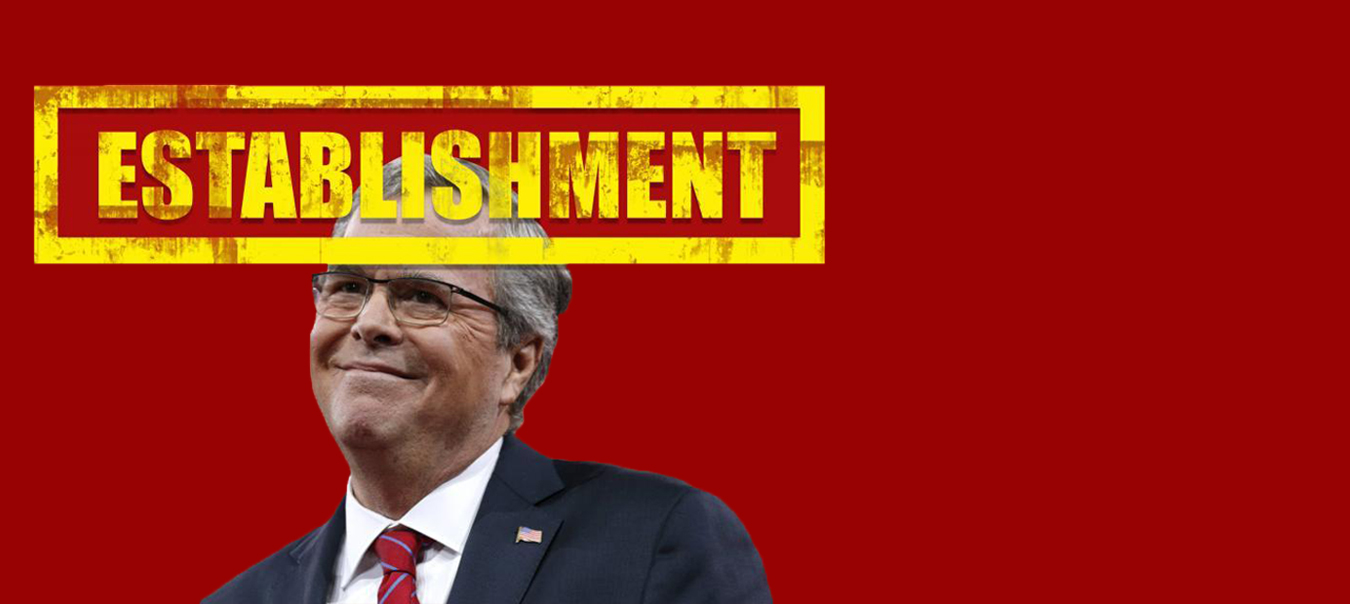Jeb Bush, and the predictable arc of presidential primaries
The arc is long and it bends towards the establishment


I don't know if Jeb Bush is a naturally optimistic fellow, although if you asked him he'd surely say he is (every candidate has to proclaim their optimism, particularly about America). But in recent weeks he's had some cause for concern. Not long ago, an NBC News/Wall Street Journal poll found a full 42 percent of Republicans saying they wouldn't consider voting for him. Bush is the "establishment" candidate at a time when the Tea Party still dominates the Republican base.
And Republicans seem unusually taken with Wisconsin Gov. Scott Walker, who has all the correct positions for GOP primary voters, not to mention the glow that comes from being the Next Big Thing. After two elections in which older, familiar figures won the nomination then lost to Barack Obama, one might think the party is ready to nominate someone new.
But Bush may not have to worry. If the primaries go the way they usually do, he'll prevail.
The Week
Escape your echo chamber. Get the facts behind the news, plus analysis from multiple perspectives.

Sign up for The Week's Free Newsletters
From our morning news briefing to a weekly Good News Newsletter, get the best of The Week delivered directly to your inbox.
From our morning news briefing to a weekly Good News Newsletter, get the best of The Week delivered directly to your inbox.
Nothing is guaranteed, of course. But despite all the ups and downs, the debates and ads, the attacks and gaffes, there's a predictable arc to presidential primary campaigns, one that almost always ends the same way.
Here's how it works. In most primary races there's one candidate who seems to be the obvious front-runner, like a sitting vice president or someone who ran before and almost won. In this year's GOP race, Jeb Bush is the closest thing. In the early stages of the "invisible primary," he raises gobs of money and secures the endorsement of key politicians and party leaders. Then someone else comes along, that "fresh face" who's novel and compelling — for a while. Once the voting actually starts, the establishment candidate turns out to have a deeper base of support than it seemed, and as he accumulates victories, the primary voters who months before thought he was old and tired now see him as their best option for winning the general election.
If that sounds familiar, it should. The current primary system in which voters, not backroom wheelers-and-dealers at the convention, choose the nominee was devised by the Democratic Party before the 1972 campaign and quickly adopted by Republicans as well, but it took a couple of elections for everyone to realize how it actually worked. Before 1976, no one thought Iowa was all that important; Jimmy Carter realized what a win there could do for him, and used it to slingshot past the field.
But if we look just since 1980, we see that there have been 12 contested primary races. In 10 of those 12, the candidate declared the early frontrunner held off the challenge from the upstart trying to defeat him. On the Republican side, Reagan beat Bush in 1980, Bush beat Dole in 1988, Dole beat Forbes in 1996 (noticing a pattern yet?), Bush beat McCain in 2000, McCain beat Romney in 2008, and Romney beat, well, a bunch of chuckleheads in 2012. The "establishment" candidates went six for six.
A free daily email with the biggest news stories of the day – and the best features from TheWeek.com
On the Democratic side, things have been slightly more open — but only slightly. The pattern held in 1984 (Mondale over Hart), 1992 (Clinton over Tsongas), 2000 (Gore over Bradley) and 2004 (Kerry over Dean first, then Edwards), while the 1988 race was more wide-open than any during this period, with no clear front-runner until Super Tuesday. And then there's 2008.
That year's remarkable primary campaign was the exception that proves the rule. Hillary Clinton was the only candidate over this period in either party who began the primary season as the clear frontrunner but ended up losing. While her campaign did plenty of things wrong, the real cause was the once-in-a-generation, maybe once-in-a-lifetime campaign of Barack Obama.
So why do things always seem to go this way? There are many reasons. First, being the choice of the "establishment" matters a lot, despite the fact that almost no one uses that word as a compliment. It usually means you can raise more money, the most skilled and experienced operatives will join your campaign, and the key party figures who can bring in votes — like that county party chair in Iowa whom few people have heard of but who can deliver on election day — will be much more likely to be on your side.
Second, the challenger candidates are often raised up by the media, then torn down just as quickly. Journalists desperately want a race, but one with as few candidates as possible. A coronation is boring, but a cacophonous jumble stretches their reporting resources and deprives them of a dramatic one-on-one narrative. Once that challenger rises, though, he or she will inevitably stumble, which can be its own thrilling story (even if it's largely media-created; you may recall that after the 2004 Iowa caucus, Howard Dean said "Yeeeah" to a crowd of supporters, which made reporters who a month earlier were marveling at his internet-driven campaign conclude that he was some kind of maniac who shouldn't be allowed within a mile of the White House).
Because the challenger is almost always not as well-known or funded, he has a smaller margin for error. One loss in an important state and journalists may declare his campaign over — after which he'll see his money dry up and his supporters desert him for a candidate who still seems to have a chance — while the frontrunner can come back from early defeats, as most of them do.
Of course, 2016 could be different. Scott Walker or Marco Rubio might turn out to be this election's Barack Obama, not this election's Gary Hart. But the odds are against it.
Paul Waldman is a senior writer with The American Prospect magazine and a blogger for The Washington Post. His writing has appeared in dozens of newspapers, magazines, and web sites, and he is the author or co-author of four books on media and politics.
-
 What would a UK deployment to Ukraine look like?
What would a UK deployment to Ukraine look like?Today's Big Question Security agreement commits British and French forces in event of ceasefire
-
 Nicolás Maduro: from bus driver to Venezuela’s president
Nicolás Maduro: from bus driver to Venezuela’s presidentIn the Spotlight Shock capture by US special forces comes after Maduro’s 12-year rule proved that ‘underestimating him was a mistake’
-
 Artemis II: back to the Moon
Artemis II: back to the MoonThe Explainer Four astronauts will soon be blasting off into deep space – the first to do so in half a century
-
 Bari Weiss’ ‘60 Minutes’ scandal is about more than one report
Bari Weiss’ ‘60 Minutes’ scandal is about more than one reportIN THE SPOTLIGHT By blocking an approved segment on a controversial prison holding US deportees in El Salvador, the editor-in-chief of CBS News has become the main story
-
 Has Zohran Mamdani shown the Democrats how to win again?
Has Zohran Mamdani shown the Democrats how to win again?Today’s Big Question New York City mayoral election touted as victory for left-wing populists but moderate centrist wins elsewhere present more complex path for Democratic Party
-
 Millions turn out for anti-Trump ‘No Kings’ rallies
Millions turn out for anti-Trump ‘No Kings’ ralliesSpeed Read An estimated 7 million people participated, 2 million more than at the first ‘No Kings’ protest in June
-
 Ghislaine Maxwell: angling for a Trump pardon
Ghislaine Maxwell: angling for a Trump pardonTalking Point Convicted sex trafficker's testimony could shed new light on president's links to Jeffrey Epstein
-
 The last words and final moments of 40 presidents
The last words and final moments of 40 presidentsThe Explainer Some are eloquent quotes worthy of the holders of the highest office in the nation, and others... aren't
-
 The JFK files: the truth at last?
The JFK files: the truth at last?In The Spotlight More than 64,000 previously classified documents relating the 1963 assassination of John F. Kennedy have been released by the Trump administration
-
 'Seriously, not literally': how should the world take Donald Trump?
'Seriously, not literally': how should the world take Donald Trump?Today's big question White House rhetoric and reality look likely to become increasingly blurred
-
 Will Trump's 'madman' strategy pay off?
Will Trump's 'madman' strategy pay off?Today's Big Question Incoming US president likes to seem unpredictable but, this time round, world leaders could be wise to his playbook
